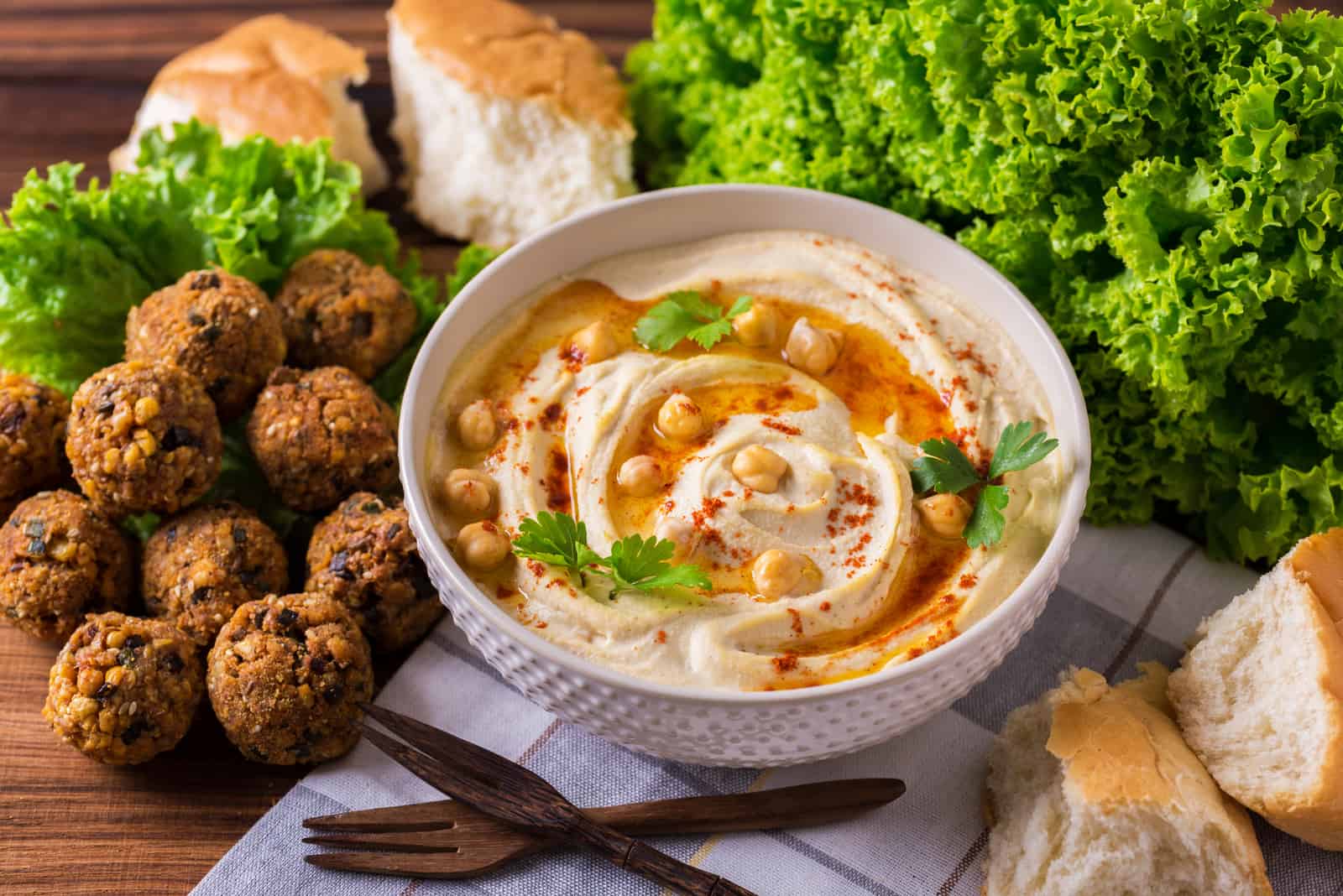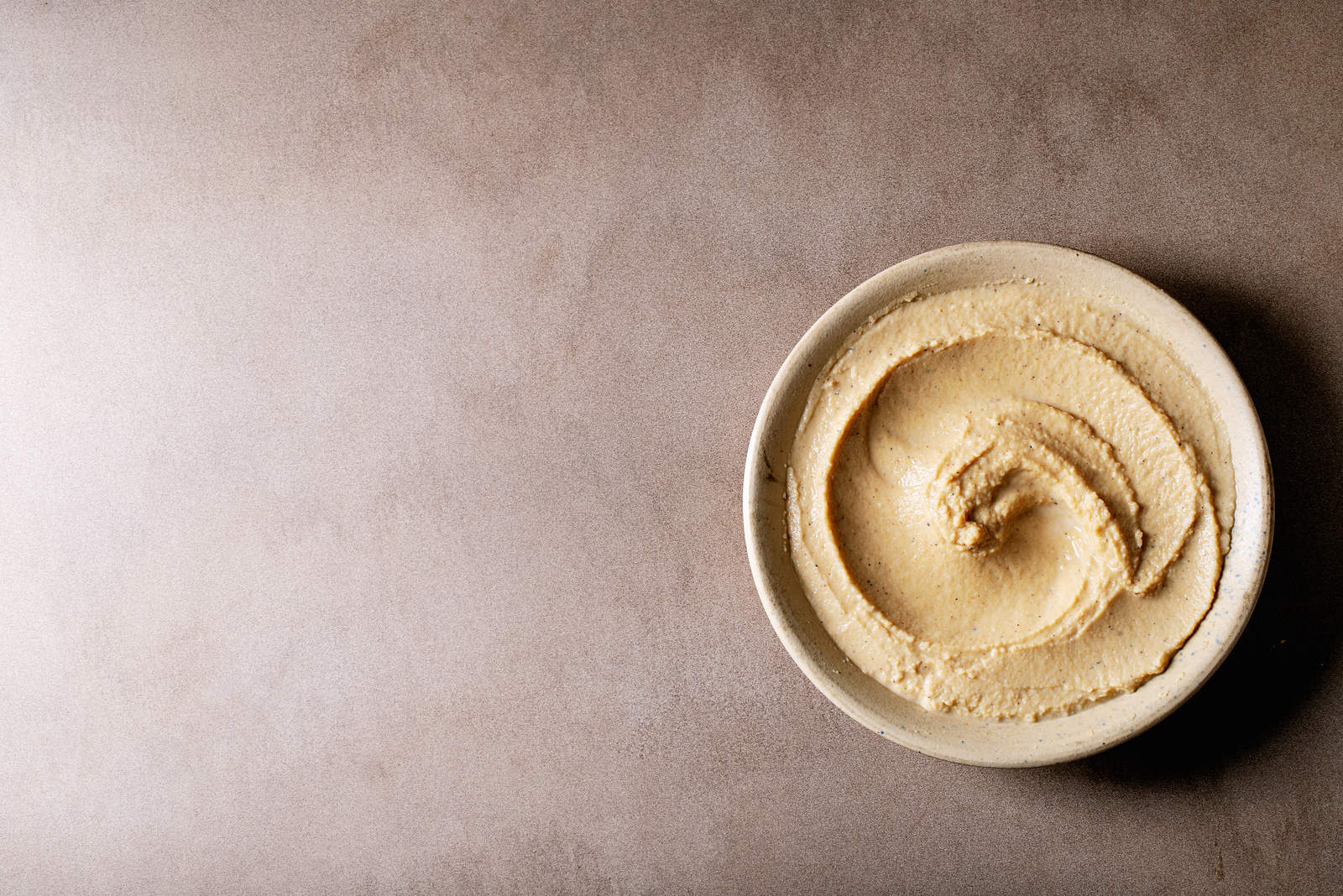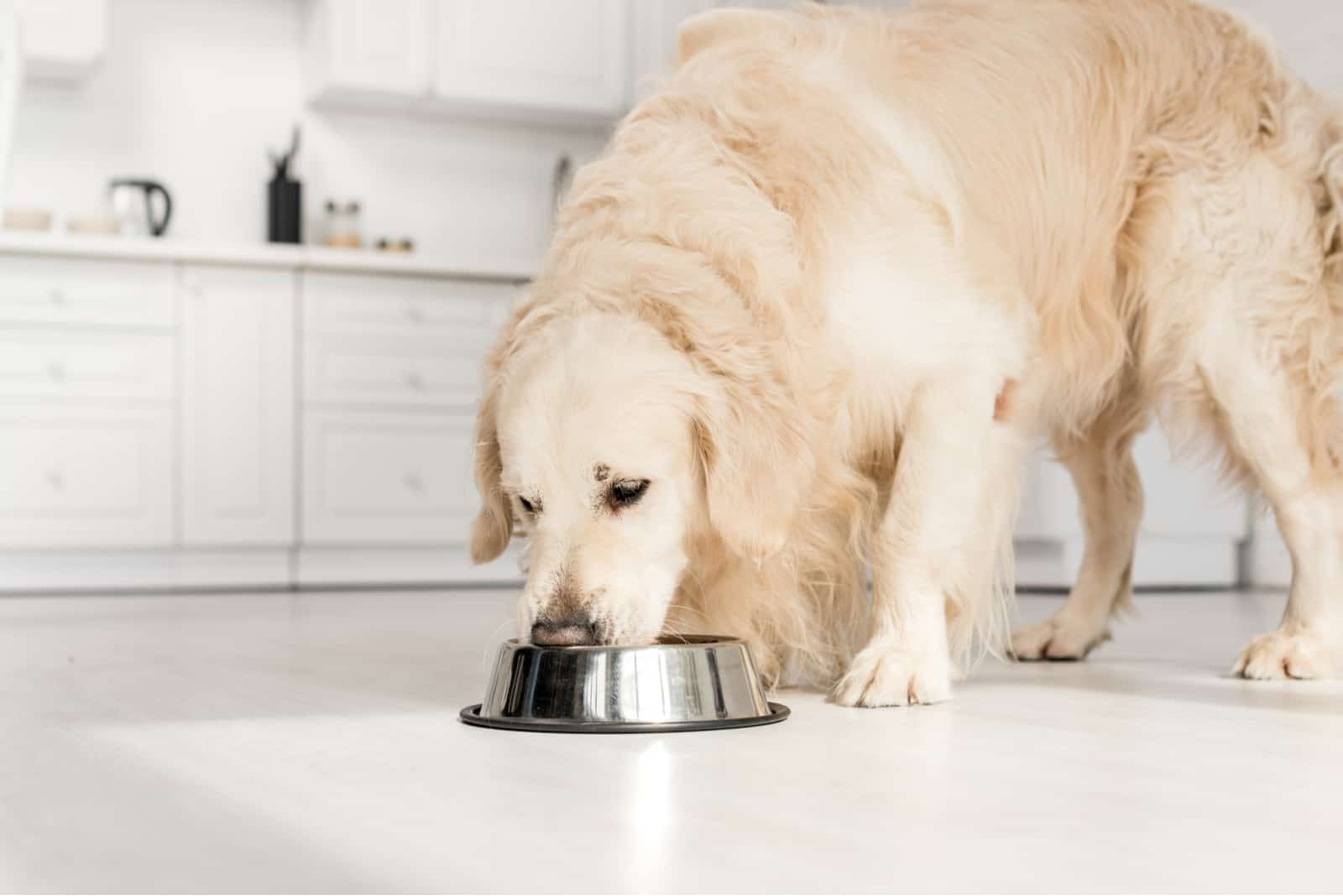When it comes to healthy eating, you can’t get much healthier or more delicious than the Middle Eastern delicacy called hummus.
Although recipes vary from place to place, the basic ingredients have remained unchanged for hundreds of years.
Hummus probably originated in 13th century Egypt, though some people believe it is mentioned in the bible.
So, this superfood, made from cooked and mashed chickpeas (garbanzo beans), olive oil, tahini (sesame seed pulp), garlic, and a splash of lemon juice, is seriously good for us. It’s popular amongst vegans and vegetarians, as well as the health-conscious.
And if it’s beneficial to our health, then you’d probably expect it to have the same effect on other creatures, wouldn’t you?
Well, let’s dig deeper and discover the answer to the question, can dogs eat hummus? Or will it make them sick?
It’s All In The Ingredients

We’ll begin with the main ingredient, chickpeas. In their basic form, cooked and without any other added ingredients, they may be bland, but they’ll be safe for your dog to eat.
However, there are other factors to consider. Although the main ingredient is okay, other added ingredients may be harmful. But more on that later.
Chickpeas provide essential vitamins, minerals, and proteins, as well as being high in fiber.
It’s a good idea to introduce these to your dog’s diet slowly, as large amounts may cause bloating, gassiness, and abdominal pain. Otherwise, chickpeas offer many health benefits, including the following:
• Vitamin A – essential for your furry friend’s nervous system, skin, eyesight, and coat. Especially important for puppies and pregnant females.
• Vitamin C – works as an antihistamine in dogs to reduce inflammation and allergic reactions. It is also an antioxidant that fights free radicals, which damage healthy cells to cause tumors and other related issues. This vitamin also boosts the immune system by increasing antibody levels that combat infection, disease, and cancerous cells. Furthermore, vitamin C aids the production of collagen, vital for joint and bone health. As a dog owner, you may know only too well the heartbreak of seeing your beloved pet suffer from conditions such as hip dysplasia and arthritis.
• Vitamin B6 – this is considered the most important of the B vitamins. It’s responsible for a range of vital functions, such as red blood cells, a healthy nervous system, the regulation of hormone levels, and glucose generation. Hemolytic anemia is a severe health concern resulting from low levels of red blood cells, which highlights the need for B6 in your dog’s diet.
• Fiber – foods that are high in fiber content can help ease constipation and make your furry friend feel more satisfied! Obesity can be a problem in older dogs; adding some chickpeas to their regular dogfood will trick them into feeling full for longer.
• Potassium – good for maintaining heart, kidney, and muscle function, as well as regulating the digestive system.
• Lecithin – sharpens brain function, aids digestion of dietary fat, and improves the condition of your dog’s coat.
• Manganese – the health benefits of this mineral can’t be overstated! It helps to provide a strong and healthy skeletal structure and promotes the proper functioning of the internal organs. Similar to vitamin C, it combats the free radicals that damage cells. Sufficient manganese levels will aid in the digestion of carbohydrates and proteins and kick-start around three hundred different enzymes into getting to work. Some of these will involve converting that food into energy, ensuring your precious pooch is full of vitality and strength.
• Choline – another fantastic macronutrient with a whole host of health benefits! It helps with the healthy functioning of the brain, lungs, muscles, liver, and metabolism.

Photo from @skylaroptsoutside
And that’s just in the chickpeas! So, what of the other ingredients?
Garlic
It’s a well-established fact that onion and garlic (and all members of the allium family) are toxic to dogs. Everyone knows this, right?
The thing is, recent studies have shown that this is not exactly true! In the past, any amount of garlic (and onion) was considered potentially harmful because of the thiosulfate that damages red blood cells, leading to anemia and, potentially, death.
In recent times, however, research has shown that garlic can actually be beneficial to dogs, but it all depends on the quantity and how it is delivered into the digestive system.
The assertion that garlic is toxic to dogs is still promoted across petcare websites worldwide, and in some senses, this is good.
Though the old research was based on large quantities of garlic being fed to test subjects (20 cloves, in some cases!), none actually succumbed to hemolytic anemia.
But it is always wise to exercise caution when it comes to looking after our beloved pets.
Hummus recipes can vary greatly, with different quantities of garlic according to taste. A large amount of hummus over a long period, even with moderate use of garlic, may have an adverse effect. The symptoms of garlic poisoning are no joke; drooling, diarrhea, dark, discolored urine, lethargy, and even loss of muscle control, aside from the problem of anemia mentioned above.
Lemon Juice
Dogs won’t naturally be drawn to lemons or any citrus fruits. They simply don’t enjoy the sourness. And think about just how much that citrus scent and flavor will be magnified!
But aside from this, the aromatic oils and psoralen compounds present in lemons are toxic to dogs.
While a tiny amount isn’t harmful, it’s best to avoid giving them anything with lemon in, as your dog may suffer from diarrhea and vomiting and, in extreme cases, could even become sensitive to light.
Surprisingly, considering dogs are well-known as omnivores, their stomachs are often more sensitive than ours. Citric acid will give them a stomach ache.
Salt
Processed chickpeas, as found in hummus bought from the store, will probably contain added salt, which is bad news for your furry friend. We need condiments in our human food, such as salt, pepper, herbs, and spices.
Dogs don’t need these extras. They do, however, need some sodium for their bodies to function properly.
Sodium chloride is essential for manufacturing hydrochloric acid in the stomach in order to digest food.
Human food, especially processed food and snacks, tends to be high in salt content and therefore unsuitable for dogs.
Too much salt in your dog’s diet could lead to hypernatremia (salt poisoning), which includes symptoms of diarrhea, vomiting, and dehydration. They may become lethargic and even start convulsing.
In these cases, you should seek medical assistance as a matter of urgency! As a general rule, just remember – all things in moderation.
Tahini
The good news is that, as dogs can’t digest seeds, tahini (sesame seed paste) is better for them as it can be digested, allowing them to gain the nutritional benefits. Sesame seeds contain sesamin and sesamolin, both of which help to lower cholesterol levels.
They also contain manganese, copper, vitamin B1, and calcium, as well as being stuffed with fatty acids (healthy ones!) and protein. So far, so good.
But, as with sodium and most things in general, you need to make sure you don’t overdo it. Just two tablespoons of tahini contain around 190 calories!
Keep a careful eye on your dog’s bodyweight to ensure they are not consuming more calories than they burn off.
Olive Oil
The health benefits of olive oil have been prized for many centuries. But does this apply to our canine friends? Well, yes! But once again, be careful to avoid giving them too much.
Olive oil contains so many excellent properties, especially if an extra virgin variety is used. It is rich in antioxidants, omega-6 and omega-3 fatty acids, and is high in monounsaturated fats. A word of caution; it can act as a laxative.
The good news is that it can help to avoid diabetes and cardiovascular disease. It also contains cancer-preventing compounds, helps with brain function, and promotes a healthy immune system.
So what have we learned about hummus?

On the whole, we can see that most of the ingredients are safe for dogs, providing essential vitamins, minerals, proteins, and fiber.
However, some need careful monitoring, whereas others should be avoided for the sake of your pooch’s health.
At the start, we asked the question, can dogs eat hummus?
Looking at the ingredients, you’d be tempted to say yes. It is packed with nutrients that would surely keep your pet in great shape and ensure they are around for us to love and look after for many years to come.
The trouble is that the combined ingredients may negatively affect their health, which outweighs the positives. With store-bought produce, the amount of salt (and other additives) will probably be higher.
There’s also no way of telling how much garlic is present in any particular brand or batch of hummus. And there are many different varieties, including some with spices such as cayenne pepper, cumin, paprika, and so on.
While not actually harmful in most cases, they are something you may be wise to avoid in large amounts (especially in the case of cayenne, or any hot peppers, which could cause burning and irritation).
As mentioned above, members of the allium family are a no-no too. In small amounts, they may be fine. But it’s hard to gauge how much is present in a batch of hummus, particularly when in powdered form.
So, what’s the answer? We have seen just how beneficial some of these ingredients can be, so it would be a shame for your dog to miss out on such a healthy treat.
DIY ‘hummus’ for dogs

For the sake of your beloved pet’s health, let’s err on the side of caution and say that in general, dogs can’t eat hummus – at least, not in the form in which we buy it at the store.
There’s a risk that the salt levels will be too high, the lemon juice will upset their stomach, or that the garlic will be too strong and lead to red blood cell damage.
Don’t panic if they manage to grab a sneaky bowlful of hummus when your back is turned. The results, while possibly unpleasant, should not be long-term.
But if they do show any prolonged symptoms, it’s always best to get them checked over by a qualified veterinarian.
You don’t want your fur-baby to miss out, and that’s understandable. So why not give them their own version of hummus?
As we said before, dogs don’t need seasoning and extra flavors to enhance their food, so you can skip all those ingredients that cause problems and provide them with a healthy alternative.
As a guide, you could try the following recipe:
• 400g chickpeas, cooked and mashed (if using a can, rinse them well to get rid of some of the salt)
• 4 tablespoons tahini
• 1/2 tablespoon olive oil
• a dash of cold water (add more if the consistency is too thick)
You can add a tiny pinch of paprika or cumin if desired, but it isn’t really necessary.
Blend all these ingredients together and store in the refrigerator for up to a week.
Remember not to give your dog too much at a time, and keep an eye out for any changes in their behavior, particularly in relation to their ‘toilet’ habits.
Some dogs may react more than others, with the main problem being an excess of gas. If these problems continue, try adjusting the amount you give them.
And if they really react badly, you may just have to find another way of improving their diet.
Otherwise, keep feeding this home-made mixture to your furry friend to keep them in the best of health!
Read Next: Pumpkin Seeds For Dogs — 9 Health Benefits Of Pumpkin Seeds

